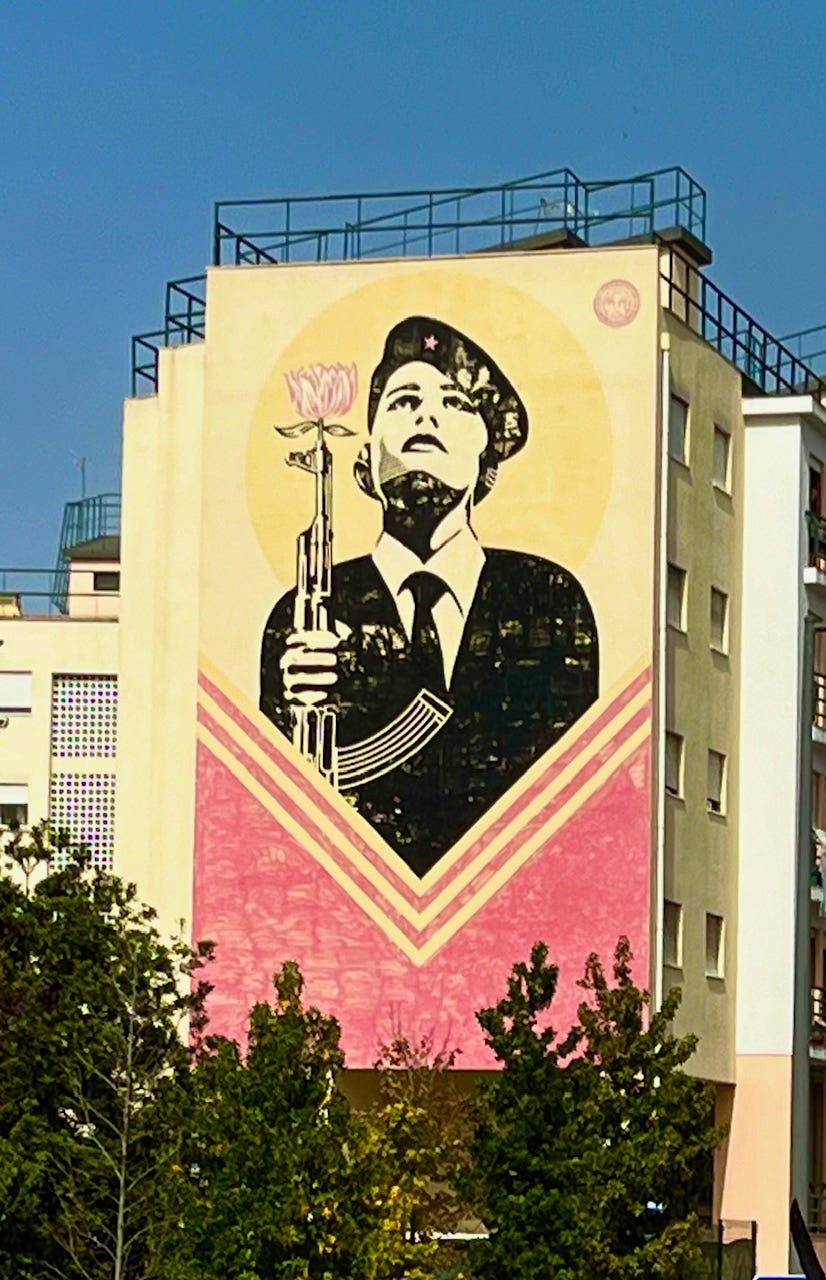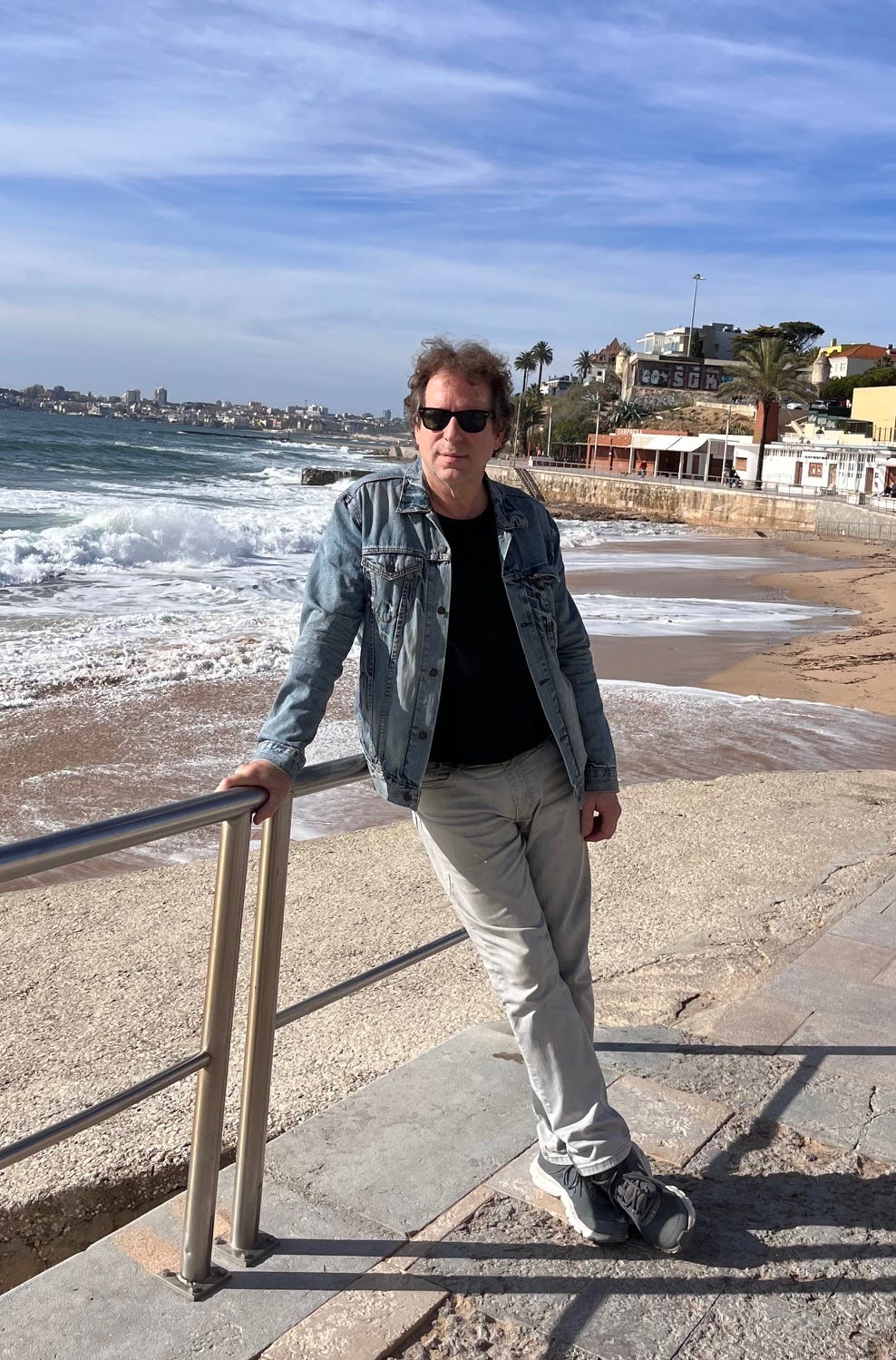The Good, the Bad and the Ugly American
Expatriate Dennis Bailey provides an honest view from abroad.

[Editor’s note: I’m very pleased to publish the debut of The Good, The Bad and the Ugly American, our new monthly column by Dennis Bailey, the legendary political operative responsible for the election of Angus King as governor in 1994 and 1998. I’ve since forgiven Dennis of the sin of convincing Mainers that Angus ain’t a corporatist, just a regular motorcycle ridin’ guy, because as a former investigative journalist-turned-PR specialist, Dennis always has an erudite take on the world around him. And as longtime Crash Report readers will remember, Dennis, before anyone else in Maine politics, realized the now-convicted serial pervert Eliot Cutler was a bad man. I just ordered (and you should too) his new book Óla Portugal: Why I Moved to the Land of Sunshine and Sardines to understand how a kid from Livermore Falls escaped from the United States.]
The Good, the Bad and the Ugly American
Chapter 1
by Dennis Bailey
I moved to Portugal three years ago, thinking I’d learn a lot about the country. And I have. But in many ways, I’ve learned more about America.
And it’s not all good.
At one time, Europeans viewed America as a land of hope and dreams. The shining “city on a hill,” as Ronald Reagan put it (quoting Puritan John Winthrop, who was quoting scripture). After WWII, Europeans saw America as their benevolent protector, the strong and stable defender of democracy. Some traditionalists did worry about America’s encroaching influence on European culture and lifestyle, particularly among young people. But my impression is the Portuguese have long regarded America as a wealthy, powerful ally, devoted to upholding the ideals of liberty and freedom. I’ve been surprised at how closely people here follow events in America. It’s a place they aspire to visit (or emigrate to). And they’ve proudly called the U.S. a friend.
It’s astonishing how quickly that view has changed.
One example: last year, at a dinner party, I got into an argument with a Portuguese acquaintance about Trump. This was during the campaign against Kamala Harris. He defended Trump and viewed him as a strong leader.
“He does what he says,” my friend insisted, claiming Trump “deserved reelection because he delivered on every single one of his promises.”
I corrected him with the facts. (He never built the wall. He never proposed a health care plan to replace Obamacare. Or the infrastructure plan he promised. He exploded the debt he promised to eliminate, et al.)
But to no avail.
Then a few days ago, I ran into this acquaintance again. He’d changed his tune. By a lot. Now he sees Trump as an agent of chaos, making a mess of everything.
“What is he doing?” he asked incredulously.
What shocked him most was Trump’s use of Kremlin talking points to describe the war in Ukraine, claiming nonsensically that Ukraine started the war and calling the democratically-elected Zelenskyy a dictator. (Yes, he’s suspended elections, but so did Winston Churchill, five times, when England was fighting its war of survival.) Trump’s crazy talk of annexing Greenland, making Canada the 51st state and taking the Panama Canal also bothered him. Even Trump’s weird fixation on the rights of transgender people confused him.
“Like that’s the big issue we should be concerned about,” he said, rolling his eyes. (It’s certainly not an issue here.)
My friend intuitively understood Trump’s chest-beating on how America should take Greenland or the Panama Canal, by force if necessary, to strengthen America’s “national security.” That is just to give Putin cover for his unlawful invasion of Ukraine.
“Putin is thinking, ‘That’s what I said. If Trump can do it, so can Russia.’ How is it any different,” my friend asked. “Or China. How can Trump stop them from taking Taiwan when he’s saying he’s going to take over all these other countries?”
That’s what’s really bothering people in Portugal and Europe. If Russia were to attack or invade the Balkans, for example, do you really think Trump would send troops to defend countries like Slovenia or Croatia? Countries he couldn’t find on a map, even though they are members of NATO? Would he support any guardrails against Putin? What if Putin tries to take Poland?
I can’t say that my friend’s view is universal in Portugal, but I have noticed a definite shift in people’s attitudes toward the U.S. And not everyone blames Trump. They hold the American people responsible for electing such an erratic, wannabe king.
To understand Portugal’s unease with Trump’s authoritarian tactics, you have to understand a bit of their history. In 1932, António de Oliveira Salazar was named prime minister of Portugal after years of turmoil and chaos. Salazar promoted traditional, conservative, anti-liberal values centered around the so-called “three Fs:” Fado (music), Fátima (religion) and Futebol (soccer). They were used to distract and discourage the population from political engagement, promoting the notion that politics should be left to the political elite and corporations. Civil liberties were severely restricted. Newspapers were censored and were required to support the regime’s policies or face closure. Books were banned. Artists and writers were suppressed. Salazar relied heavily on a secret police force to monitor and report any opposition. Ordinary citizens were cautious about discussing politics or expressing dissenting views in public for fear of being reported to the authorities.
“We didn’t always know who we were talking to,” one elderly resident told me. “So we didn’t talk.”
But dissent was quietly growing, not only among the general population but significantly among the military. By the 1960s and 70s, Portugal was embroiled in costly and prolonged wars in its African colonies (Angola, Mozambique, Guinea-Bissau) that were seeking independence. The “Colonial War” was draining Portugal’s resources from an already weak economy and causing widespread discontent.
Salazar suffered a stroke in 1968 and was removed from power, although no one told him. (He believed he was still running the country until his death in 1970.) His successor, Marcelo Caetano, continued Salazar’s regime and its repressive policies.
The combination of the military’s frustration with colonial policies plus economic stagnation and political repression ultimately resulted in a group of lower officers forming the “Armed Forces Movement” (Movimento das Forças Armadas – MFA) and they meticulously plotted a coup. Early on April 25, 1974, MFA forces took control of strategic points around Lisbon and faced little resistance. By mid-morning, they had surrounded government buildings. Caetano-the-dictator took refuge at a military barracks. Soon, though, he surrendered. Thus, in this so-called “Carnation Revolution,” the longest-lasting authoritarian regime in modern Europe collapsed without a single shot being fired.
Today, Portugal is a democratic republic with a semi-presidential system. It is not strictly a “social democracy” as the term is commonly used, but has strong progressive elements — universal healthcare, public education and workers’ rights — mostly due to the influence of the Socialist Party (PS), which has been one of the dominant political forces since the 1974 revolution.
When I left America for Portugal in 2021, I told friends that I felt the U.S. was headed toward an authoritarian state.
One of them warned against my move. “If America descends into fascism,” he predicted, “it won’t be long until that spreads over Europe.”
Maybe, but he was apparently unaware, like most Americans, how Portugal already had its turn with fascism. Almost 50 years of it. The Portuguese I’ve talked to here are still proud of that moment in 1974 when Salazar’s dictatorship was toppled. And despite recent inroads by the ultra-right Chega party, I don’t think they’ll go back.
America? I’m not so sure. And neither are the people in Portugal.
Like almost everyone on this planet, the Portuguese have been indoctrinated with the notion that America is the greatest nation on earth. However, recent events have caused them to rethink that belief. Many Portuguese are stunned when they learn that America doesn’t offer things like mandatory paid family leave. Or lengthy paid vacations. (Over here, there’s a required minimum of 22 days a year, plus 13 mandated paid federal holidays.) Even more so, the Portuguese are perplexed by the expensive, bloated U.S. healthcare system. In Portugal, free or low-cost universal health care is enshrined in the nation’s constitution.
I discovered this on my first visit in 2019. One night at a bar, I struck up a conversation with a couple from Porto sitting next to me. The guy told me they were engaged, and his fiancé was a doctor. I made some crack about being on Easy Street by marrying well. He looked at me somewhat perplexed.
“It’s not like that here,” he said, shaking his head. His fiancé makes a nice living, especially by Portuguese standards, but nothing compared to what doctors make in America. In fact, doctors here earn an average of only about €80,000/year, almost five times less than the average pay for doctors in the U.S.
And Portugal’s healthcare system is highly rated, higher than the U.S. system.
It’s the same with college costs. Tuition at most public universities averages between €750 and €1,500 a year, compared to around $30,000 a year for out-of-state students at U.S. colleges. That’s one of the reasons Portugal has an adult literacy rate of around 97 percent, while the U.S. literacy rate is considerably lower – about 79 percent – with a large portion of adults reading below a sixth-grade level. And kids over here don’t graduate with tens of thousands of dollars in student loan debt.
Then there’s the matter of gun violence and mass shootings. Practically non-existent in Portugal. My elderly Portuguese neighbor met me in the hall of my apartment one day, sobbing, after watching the news of a mass shooting of school kids in the U.S. (I forget which one).
“What’s wrong with America?” she tearfully asked.
I had no answer.
My home state of Maine (about equal to the size of Portugal) likes to brag about having one of the lowest crime rates in the U.S. But even with ten times the population, Portugal’s murder rate is dramatically lower than Maine’s. Under one percent compared to around 2.2 percent.
The point: the people of Portugal seem to be realizing, compared to America’s calamity and disquieting turn toward authoritarianism, they can be proud of their country. Portugal and other European countries, thanks to Trump, no longer have to think of themselves as second-rate behind the U.S.
Portugal has its own problems with low wages, high unemployment, rising housing costs and political corruption. But Portugal’s overall quality of life is hard to beat. And as events transpire in the States, I find it hard to be the proud expat standing up to defend my former country.
These days, a common question I’m asked is, “Are Americans just stupid?”
I honestly don’t know what to say.
Dennis is the author of Óla Portugal: Why I Moved to the Land of Sunshine and Sardines (and how you can too), available on Amazon. Born and raised in Maine, Dennis is a former journalist and served for six years as communications director for Gov. Angus King before operating Savvy, Inc., his public relations firm in Portland. He now lives in Carcavelos, Portugal.






Great piece! Really appreciate the point of view. Yep, I'd move there ...
This is eye opening, and such a good read.